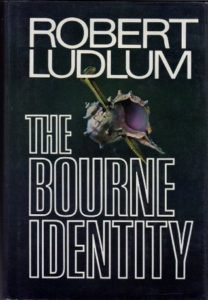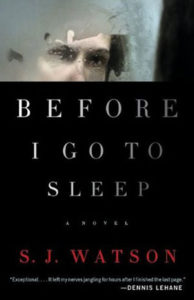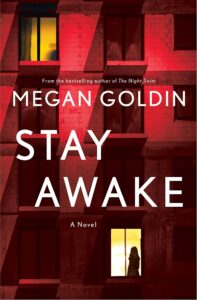One of my favorite aspects of psychological thrillers is when the author manipulates the characters’ sense of reality—and one of the best ways to do this is by disrupting their memory. In my novel, Imposter, I explore the complexity of memories after trauma, including a very real disorder called Capgras Syndrome, where the person affected believes that their loved ones have been replaced by identical-looking imposters. As a physician and author, it was important to me that I represent this condition realistically—but some authors have taken a bit more liberty with medical facts. That doesn’t necessarily spoil the fun; a healthy suspension of disbelief is required when reading any thriller. It’s also fun to discuss which types of amnesia are real, which are invented, and what purpose those choices serve in the narrative.

The Bourne Identity By Robert Ludlum
No discussion of this topic would be complete without this classic book-turned-film. Jason Bourne wakes up on a fishing boat in the Mediterranean with no memory of his identity or past. But as the story unfolds, the reader learns that Bourne has retained complex motor skills from his past—like speaking multiple languages, martial arts, and shooting.
Could this actually happen? Yes and no. It is possible to lose certain types of memory and retain others. Memory can be roughly divided into two categories: declarative and procedural. Declarative memories include anything you can “declare” or tell someone, like the capitol of Turkey or what you had for dessert on Sunday. Procedural memories include skills that you can demonstrate, such as how to play an instrument or ride a bike.
After a traumatic brain injury resulting in post-traumatic amnesia, procedural memories are typically retained, while declarative ones are lost. Post-traumatic amnesia can be retrograde (loss of memories formed before the injury) or anterograde (unable to create new memories after the injury). Bourne could be suffering from retrograde amnesia, however this typically only affects memories stored shortly before the injury, not years ago, and not the person’s entire autobiographical past.

Before I go to Sleep by SJ Watson
In this bestselling psychological thriller, Christine has no memory of her identity and past, and when she goes to sleep, her memory of the prior day is completely erased. It’s like Jason Bourne plus Drew Barrymore’s character from the movie “50 First Dates,” except Christine’s husband isn’t the sweet and affable Adam Sandler.
Could this actually happen? Probably not. I couldn’t find any reports of disorders that cause memory loss after falling asleep. People can develop short-term memory loss, but short-term memory, also called “working memory,” only lasts for 15-30 seconds before it must be encoded as long-term memory. Examples might include walking into a room and forgetting why you’re there or being unable to follow a recipe because you can’t remember what step you’re on. So no, Christine’s memory loss isn’t realistic. But does it make for a fascinating setup for a thriller, ramping up the tension and stakes as Christine—and the reader—slowly realizes that she’s in danger? Absolutely.

Find Me by Alafair Burke
A woman is found after being thrown from an overturned vehicle, not knowing her own identity—again, much like Jason Bourne. Fifteen years later, her amnesia has still not recovered…and then she vanishes without a trace.
Could this really happen? The vanishing part, sure. But the long-term amnesia? Probably not, for the same reasons explained above. This pattern of amnesia—losing memories of one’s autobiographical past and personal identity—is not typically seen after a traumatic brain injury and is suggestive of a psychogenic cause (more on that below). But again, does it work for the story, keeping the reader turning pages, desperate to find out what happens next? Yes!

Stay Awake by Megan Goldin
Two years ago, Liv developed a memory disorder in which all new memory is erased every time she goes to sleep—similar to Christine in Before I Go To Sleep. Now Liv has woken up to find a bloody knife hidden in her pocket, and she thinks she may be responsible for a murder. Again, not medically accurate, but certainly a great setup for a thriller, and watching Liv unravel this mystery makes the reader feel like we’re along for the ride.
But a structural brain injury isn’t the only possible mechanism for amnesia; it can also be related to psychological trauma. Once you add in psychological issues, everything gets a whole lot more complicated—and interesting.

In the Woods by Tana French
Detective Garda Rob Ryan is investigating the murder of a child in the same woods where he survived a vicious attack during his own childhood, which he now barely remembers. He must rely on those fragments of memory to solve the current case and the one from his past.
Could this really happen? Absolutely. This type of psychogenic amnesia, called dissociative amnesia, occurs when the memories of a traumatic event are blocked or distorted. This literary device allows the detective to work through his own traumatic past while investigating the case, adding emotional depth and weight, elevating the story above an average murder mystery.

Mr. Nobody by Catherine Steadman
A man is found washed up on a British beach, with no identification or memory of his past, unable to speak. His case sparks interest from a neuropsychiatrist who comes to evaluate him to determine if she can treat this rare case.
Could this really happen? I don’t want to spoil the book (you’ll have to read it to find out what happened to Mr. Nobody!) but yes, dissociative fugue is a true entity. It’s a form of memory loss that can occur after extreme stress, causing the person to dissociate from their reality for days, weeks, or even months.
During this fugue state, the person doesn’t remember their own identity or past and may even travel to a new location. When the fugue state ends, the person will regain the memories of their prior life and identity, but interestingly, they won’t remember what happened during the fugue state.

The Flight Attendant by Chris Bohjalian
Cassandra is a flight attendant with a binge drinking habit who awakens in a Dubai hotel room to find her date from the prior night dead next to her in the bed, and she has no memory of what happened. Did she do it? Did someone sneak in and kill him? Is she in danger? What unfolds next is a brilliantly plotted story unravelling not only the murder but also Cassandra’s own traumatic past that led to her alcoholism.
Could this really happen? Absolutely. Alcohol-related blackouts occur when a person drinks so much alcohol that it blocks their brain’s ability to encode long-term memories. Even though the person is still conscious during this period of intoxication, they will have fragmented or absent memories of the events and their own actions. This device is especially effective at causing the character—and subsequently, the reader—to question their reliability.

All is not Forgotten by Wendy Walker
In one of my favorite psychological thrillers, a young woman who suffered a brutal sexual assault is given an experimental drug to erase the memories of the event. But in the following weeks, even though she has no conscious memory of the attack, she is left with physical and emotional scars that will not allow her to forget.
Could this really happen? To my knowledge, no drug can erase specific memories, however, the body and the emotional centers of the brain can hold trauma that the person doesn’t consciously remember. So yes, the general concept makes good medical sense, and is the setup for an emotionally resonant and heartbreaking story.
*
The next time you read a novel featuring a character with memory loss, you’ll have the tools to diagnose whether the disorder is fact or fiction. But don’t let that take you out of the story. The popularity of amnesia in thrillers speaks to the innate fear we all have of losing our own identity and being unable to rely on memory. As a psychologist character says in my novel, “Memory is a story we tell ourselves.” And that story makes us who we are.
***


















